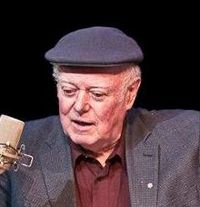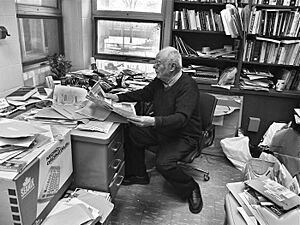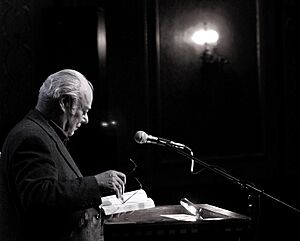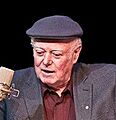Alistair MacLeod facts for kids
Quick facts for kids
Alistair MacLeod
|
|
|---|---|

Cape Breton University, 2012
|
|
| Born | July 20, 1936 North Battleford, Saskatchewan, Canada |
| Died | April 20, 2014 (aged 77) Windsor, Ontario, Canada |
| Occupation | Novelist, short story writer, professor |
| Alma mater | St. Francis Xavier University, University of Notre Dame |
| Notable works | No Great Mischief, The Lost Salt Gift of Blood, As Birds Bring Forth the Sun and Other Stories |
Alistair MacLeod, OC FRSC (July 20, 1936 – April 20, 2014) was a famous Canadian writer. He wrote novels and short stories. His stories often showed the beautiful, wild landscape of Cape Breton Island. They also featured the strong people who lived there. Many of these people were descendants of Scottish immigrants. They often thought about their family history. They tried to connect their past with their present lives.
MacLeod was known for his clear and powerful writing. He used simple words that felt like they were spoken aloud. Even though he was a master of short stories, his 1999 novel, No Great Mischief, became very popular. People voted it the best book ever from Atlantic Canada. This novel also won several important awards. One was the 2001 International Dublin Literary Award.
In 2000, two of MacLeod's short story books were put together. These were The Lost Salt Gift of Blood (1976) and As Birds Bring Forth the Sun and Other Stories (1986). They became one book called Island: The Collected Stories. MacLeod once compared his writing to playing an accordion. He said, "When I pull it out like this, it becomes a novel. When I compress it like this, it becomes this intense short story."
MacLeod taught English and creative writing for over 30 years. He worked at the University of Windsor. But every summer, he went back to his family's cabin in Cape Breton. This is where he did most of his writing. A writer named Irene Guilford said about him: "Alistair MacLeod's birthplace is Canadian. His emotional heartland is Cape Breton. His heritage is Scottish. But his writing is for the whole world."
Contents
Early Life and Education
Alistair MacLeod's family came from Scotland. They left the Isle of Eigg in the 1790s. They settled in Cumberland County, Nova Scotia. In 1808, his ancestors walked 362 kilometers to Inverness County, Cape Breton. They heard they could own land there. MacLeod wrote that his family brought their belongings, six cows, and a horse. There were few roads, so they followed the shoreline.
MacLeod was born in North Battleford, Saskatchewan. His parents spoke Canadian Gaelic as their first language. They had moved to Saskatchewan from Cape Breton. This was during the Great Depression. When MacLeod was five, his family moved to Edmonton. Then they moved to Mercoal, Alberta. His father worked as a coal miner there.
But the MacLeods missed their home. When Alistair was 10, they returned to Cape Breton. They went back to the farmhouse in Dunvegan, Inverness County. His great-grandfather had built this house in the 1860s.
MacLeod enjoyed school and did well. He told a CBC Radio interviewer that he liked to read and write. He said, "I was the kind of person who won the English prize in grade twelve." After high school in 1954, MacLeod moved to Edmonton. He delivered milk with a horse-drawn wagon for a year.
In 1956, MacLeod went to the Nova Scotia Teachers College. It was in Truro. He then taught school for a year on Port Hood Island. This island is off Cape Breton's west coast. To pay for university, he worked summers in mines. He drilled and blasted in mines in British Columbia, the Northwest Territories, and uranium mines in northern Ontario. He also worked in a logging camp on Vancouver Island. He quickly became a leader there. He could climb the tallest trees and set up cables.
From 1957 to 1960, MacLeod studied at St. Francis Xavier University. He earned a BA and a B.Ed. Then he got his MA in 1961 from the University of New Brunswick. He decided to get his PhD at the University of Notre Dame in Indiana. He went there because Frank O'Malley taught creative writing. MacLeod said he wanted to start writing his own stories. He felt this would not have happened without such a "creative, imaginative university."
He wrote his PhD paper about the English novelist Thomas Hardy. MacLeod admired Hardy. He once said he liked that Hardy's novels were about people who lived outdoors. They were greatly affected by nature. MacLeod received his PhD in 1968. That same year, he published his story The Boat. It appeared in The Best American Short Stories in 1969.
Academic Career
MacLeod was an expert in 19th-century British literature. He taught English for three years at Indiana University. In 1969, he started teaching at the University of Windsor. He taught English and creative writing for over 30 years. A student newspaper story after his death called him "a dedicated professor." It said he was "an approachable colleague" and "an inspiration to young, local writers."
Marty Gervais, a colleague, said MacLeod's office door was always open. Students, teachers, and even the public could come in. Gervais said, "He would read your work. He would be honest with you, and he would be encouraging." He added that MacLeod loved telling stories. But he was also a good listener.
Alan Cumyn, a student of MacLeod's, remembered his teaching. MacLeod focused on the basics of good writing. These included language, metaphor, characters, and story structure. Cumyn wrote that MacLeod read student work carefully. He always started by pointing out the good parts. Then he would talk about weaknesses. Cumyn said that students felt more confident and excited about their writing after meeting with him.
Another student recalled MacLeod's gentle way of giving feedback. If something bothered him, he would say, "I have a question about that, but not a big one." If he saw a mistake, he would say, "Some words and phrases startle me." When asked how long a good short story should be, MacLeod replied, "Just make your story as long as a piece of string, and it will work out just fine."
MacLeod found that teaching left little time for his own writing. He tried to write for two hours a day. But he was too tired from his teaching work. So, he did most of his writing during summer breaks. His family lived at the MacLeod homestead in Dunvegan, Cape Breton. He would spend mornings "writing in a cliff-top cabin looking west towards Prince Edward Island."
Published Works and Methods
MacLeod published only one novel and fewer than 20 short stories. He wrote slowly, by hand. He would carefully choose each sentence. He once said, "I write a single sentence at a time, and then I read it aloud."
|
I think we should realize that "story" is much older than literacy, you know, and that all kinds of people tell stories who can't read and write. But I think that as a writer...I like to give the impression that I am telling the story rather than writing the story. |
| – Alistair MacLeod |
Another Cape Breton writer, Frank Macdonald, called MacLeod a perfectionist. He said MacLeod would not release a story until it was perfect. He also said MacLeod never rewrote a story. "He wrote a sentence, and then waited, then wrote another sentence." In a 2011 radio interview, MacLeod talked about how he shaped his work. He would write the final sentence halfway through a story. He called it "the last thing I'm going to say to the reader." He said it served as a "lighthouse" for the rest of his writing journey.
MacLeod's published works include The Lost Salt Gift of Blood (1976) and As Birds Bring Forth the Sun and Other Stories (1986). The 14 stories from these books are in Island: The Collected Short Stories of Alistair MacLeod. This book also has two new stories. It came out in 2000, after his successful novel No Great Mischief. When asked why he wrote a novel after being a short story master, MacLeod smiled. He said, "Well, nothing I do is very sudden. I think I just wanted more space. I needed a bus rather than a Volkswagen to put my people in."
In 2004, MacLeod published an illustrated version of his story, "To Everything There Is a Season." It was retitled "A Cape Breton Christmas Story." In October 2012, a story called Remembrance was published. It was written for the Vancouver Writers Fest's 25th anniversary. MacLeod's books have been translated into 17 languages.
Critical Reception of His Work
Alistair MacLeod's stories received much praise, especially in Canada. Reviewers often called his collected stories, Island, "simply stunning." They praised the emotional power of his writing. One reviewer said, "Whether you are reading his stories for the first or for the eighth time, they will make you wonder and they will make you weep." Many felt his first story, "The Boat" (1968), was one of the most powerful in Canadian literature.
His novel, No Great Mischief, was also highly praised. The judges who gave him the International IMPAC Dublin Literary Award in 2001 described it. They said it was "a story of families, and of the ties that bind us to them." They also said it was about "exile and of the ties that bind us, generations later, to the land from which our ancestors came." They believed his writing would soon make his name famous. They noted the "music of the Cape Breton" in the book. They said it was "joyful and sad but always haunting." Many reviewers agreed, calling the book a "masterpiece."
Family Life
MacLeod was married to Anita MacLellan for almost 43 years. She grew up close to his home on Cape Breton Island. They married on September 4, 1971. They had seven children, six sons and one daughter. One son died when he was a baby. Their oldest son, Alexander MacLeod, is also a writer. His first short story collection, Light Lifting, was a finalist for a major award in 2010.
Death
Alistair MacLeod passed away on April 20, 2014. He was 77 years old. He had a stroke in January 2014. His funeral was held at St. Margaret of Scotland Catholic Church in Broad Cove. This was near his home in Dunvegan. He was buried in the nearby graveyard. Many generations of MacLeods are buried there.
Film About MacLeod
A documentary film was made about him by the National Film Board. It was called Reading Alistair MacLeod and came out in 2005. The film is 88 minutes long. It includes interviews with MacLeod, his wife Anita, and other family members. Famous writers like Russell Banks and Colm Tóibín read from his work. They also shared their thoughts. The film also has parts of an opera called Island. This opera was based on one of MacLeod's short stories.
Awards and Honours
Alistair MacLeod's 1999 novel, No Great Mischief, won many awards. These included the International Dublin Literary Award and the Trillium Book Award. It also won the Canadian Booksellers Association Libris Award for author of the year. In 2009, No Great Mischief was chosen as Atlantic Canada's greatest book.
In 2001, MacLeod won the Portia White Prize. This award from Nova Scotia celebrates great artistic achievements. In 2003, he won the Lannan Literary Award for fiction.
In 2008, MacLeod was named an Officer of the Order of Canada. This is a very high honour in Canada. In the same year, he became a Fellow of the Royal Society of Canada. In 2009, MacLeod received the PEN/Malamud Award for Short Fiction.
MacLeod received over a dozen honorary degrees. These were from universities like St. Francis Xavier University, Cape Breton University, McGill University, and the University of Prince Edward Island.
See Also
 In Spanish: Alistair MacLeod para niños
In Spanish: Alistair MacLeod para niños
Images for kids
 | Claudette Colvin |
 | Myrlie Evers-Williams |
 | Alberta Odell Jones |






